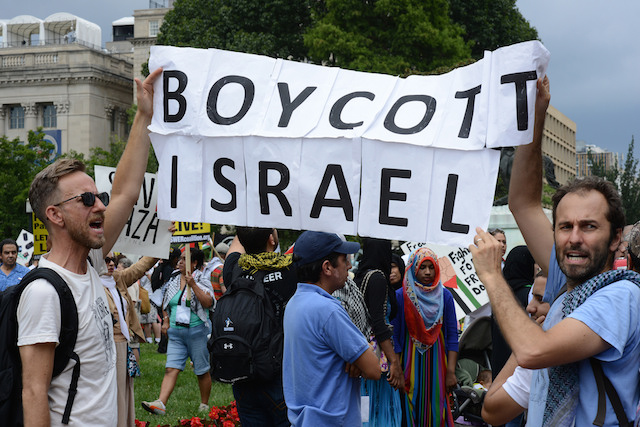The Boycott, Divestment and Sanctions movement, commonly known as BDS, says its objective is to utilize international pressure to end what it describes as Israeli apartheid and colonialism. Specifically, the movement is dedicated to ending Israel’s “occupation and colonization of all Arab lands” and dismantling the security barrier separating Israel and the West Bank. Its other stated goals are to achieve full equality for Arab Israelis and allow Palestinian refugees from the 1948 War of Independence (and their descendants) to return to their former homes in Israel. Many Jewish and Israeli leaders see the effort as a discriminatory attempt to undermine Israel’s legitimacy as a Jewish state. One of the leaders of the BDS movement, Omar Barghouti, has said that he opposes “a Jewish state in any part of Palestine.”
BDS has come to be seen as a growing challenge to Israel internationally. In the United States, its impact has largely been felt on university campuses. Israeli leaders and American Jewish groups have pushed back forcefully against BDS, seeing it as at best counterproductive to peace and at worst blatantly anti-Semitic. They have won significant support in this effort from American political leaders. In 2016, President Barack Obama signed a trade law that barred cooperation with entities that engage in BDS, though Obama indicated he would not apply that requirement to boycotts of West Bank settlements. A number of American states have also adopted anti-BDS laws.
What does the BDS movement do?
BDS supporters seek to pressure Israel in three principal ways: boycotting Israeli goods, universities and cultural institutions; divesting from companies that provide vital equipment to the Israeli military; and urging countries to slap sanctions on Israel. BDS has inspired a number of divestment campaigns aimed at university endowments. public pension funds and companies it has identified as supporting or profiting from the Israeli military occupation of the West Bank. The movement has also inspired demonstrations at Israeli cultural events abroad.
Does BDS support boycott of everything Israeli or just products from West Bank settlements?
According to its website, BDS supports boycotting “Israel’s entire regime of oppression.” In practice, this is so widely defined that virtually every Israeli product is potentially subject to boycott. BDS targets the entire Israeli agricultural sector, alleging that all Israeli farm businesses are involved in human rights abuses. It has also targeted Hewlett-Packard, because the company allegedly makes a technology used by the Israeli military against Palestinians, and Sabra hummus, because it “provides financial support” to the Israeli military.

Help us keep Jewish knowledge accessible to millions of people around the world.
Your donation to My Jewish Learning fuels endless journeys of Jewish discovery. With your help, My Jewish Learning can continue to provide nonstop opportunities for learning, connection and growth.
READ: Detroit’s Jews Ask, Are Targeted Israel Boycotts the Same as BDS?
Some, including some Jews, have proposed narrower boycotts aimed specifically at products produced in the Israeli settlements. Both the liberal “pro-Israel, pro-peace” lobby J Street, and the writer Peter Beinart, support a boycott of Israeli settlement products, because they believe the settlements are obstacles to a peaceful solution to the Israeli-Palestinian conflict. Groups of Israeli academics, artists and students have also announced that they will not participate in activities at West Bank institutions.
Is the BDS movement pro-peace?
It certainly claims to be. Proponents of BDS consider its tactics inherently peaceful and cite previous examples of successful boycott campaigns — most commonly, the fight against apartheid in South Africa in the 1980s — as models of non-violent resistance to oppressive regimes. The movement does not, however, explicitly endorse the two-state solution, the framework most of the world considers the only realistic means of ending the Israeli-Palestinian conflict. Rather, BDS is officially agnostic on that question, claiming its concerns are the basic rights of Palestinians, not the particular parameters of a peace settlement. In the eyes of many critics, because the movement offers unconditional support to the Palestinians and rarely, if ever, condemns terrorism, BDS contributes to violence and unrest, effectively incentivizing the Palestinians to oppose Israel rather than negotiate with it.
Is the BDS movement anti-Semitic?
Proponents of the anti-Semitism charge typically make two arguments. First, by focusing solely on Israel’s alleged abuses, BDS ignores countless other worse human rights abusers around the world, effectively singling out the Jewish state and holding it to a unique standard. Second, by including in its stated goals protecting the right of Palestinian refugees to return to homes they lived in prior to Israel’s establishment — something Israel considers an existential threat to its Jewish character — the movement is effectively calling for the end of the Jewish state.
“The Boycott, Divestment, Sanctions (BDS) movement aims to demonize, delegitimize, and destroy the Jewish nature of Israel, with the result of denying to Jews their right of national self-determination,” says the AMCHA Initiative, which fights anti-Semitism at American colleges and universities.
BDS defenders vigorously dispute this charge, arguing that theirs is a peaceful movement to force Israel to comply with international law. They assert that they target Israel because of its actions, not its identity, and point to the movement’s Jewish supporters as proof that it is not driven by anti-Jewish animus.
When did the BDS movement begin?
The BDS effort officially traces its origins to a 2005 call by a coalition of 170 Palestinian organizations, though some observers see its roots in the Arab League boycott of Israel launched in the 1940s. The contemporary BDS movement began to take shape during the Second Intifada, which began in 2000. Escalating violence and various major Israeli military operations in the West Bank led to a number of boycott calls beginning in 2002. The construction of Israel’s West Bank barrier, which the Palestinians largely opposed, alleging that it was a land grab rather than an effort to reduce terrorism, gave further momentum to these efforts. The 2005 BDS declaration opens by noting that Israel’s construction of the barrier was continuing despite an International Court of Justice ruling a year earlier that it was illegal.
Has BDS been successful?
The BDS website notes a number of successes, among them a 2014 UN report claiming that boycotts partially accounted for a significant drop in foreign investment in Israel that year. It also cites a small number of foreign multinationals that have pulled out of Israel under pressure and Israeli corporations whose businesses have been harmed. Several well-known artists, such as Roger Waters and Elvis Costello, have also declined to perform in Israel, citing its treatment of the Palestinians.
On the whole, the movement has been less successful in the United States than in Europe, where a number of pension funds and private banks have divested from targeted companies. In the United States, several university student bodies have called on their schools to divest. Though to date none have done so, the movement has made Israel a polarizing issue on U.S. campuses. The divestment question has also been raised in a number of liberal American Christian denominations. Despite all this, Israel has faced nowhere near the level of global isolation faced by apartheid South Africa, and its GDP continues to grow.
What are anti-BDS laws?
A number of U.S. states and the federal government have adopted laws aimed at countering the BDS movement. While the specifics differ, in general they bar the authority in question from doing business with any entity that engages in boycotts against the Jewish state. Critics charge that is a violation of free speech rights, claiming that the government should not be permitted to deny state contacts to companies simply because they disagree with their position on BDS.
Do any Jewish organizations support BDS?
Very few, and none of the major ones. The best-known is Jewish Voice for Peace, a San Francisco-based group that does not endorse a two-state solution or the principles of Zionism and which the Anti-Defamation League lists among the top anti-Israel groups in the United States. Among mainstream Jewish organizations, there is wall-to-wall rejection of BDS. The Jewish campus group Hillel officially bars pro-BDS groups from speaking under its auspices, though this policy has been challenged at a number of schools. J Street, the liberal lobbying group, rejects BDS because the BDS movement does not support a two-state solution or recognize the Jewish right to a state. J Street does support boycotts that are targeted at Jewish settlements in Israeli-occupied territory, however.



